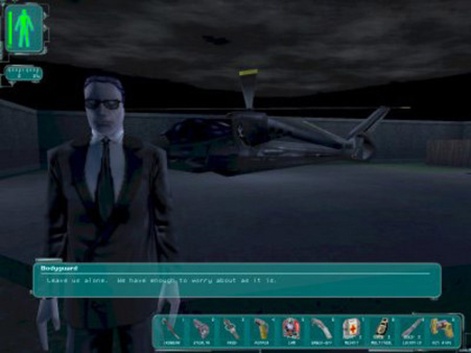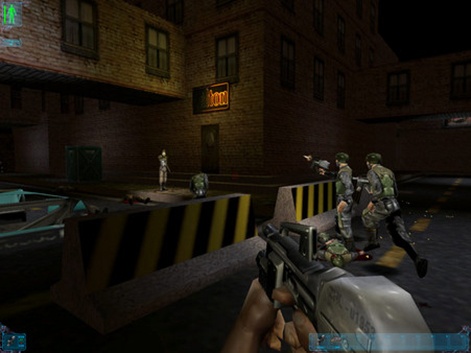In 2000, Ion Storm released Deus Ex - a sci-fi cyberpunk title that combined elements from a variety of different game genres. There were hacking and stealth mechanics, combined with shooter and weapons, creating something entirely unique and ground breaking at the time.
The game began life in 1993, when developer Warren Spector had an idea for a project called Troubleshooter. Having become bored of the popular game genres of the time, as well as their settings, he conceived of an ambitious project that combined different elements from different games.
"The initial idea was to make what I called 'the real-world roleplaying game'," Spector explains.
"I was really tired of fantasy and sci-fi and thought it'd be cool to make a game set in the real world. Related to that was the idea of letting players solve problems however they wanted to. I was tired of games that forced me to fight or sneak (the two main game verbs at the time). I wanted to make a game that would support either or both of those - and let players come up with stuff even the developers didn't think of. Every detail of the game changed, but that core survived until the day we shipped."
Having tried to get this game made at his previous employers, Origin and Looking Glass, and these ideas did make their way into an unreleased project called Junction Point. This game was cancelled and Spector laid off. But he found a new home at John Romero's studio Ion Storm, the developer also working on the wildly ambitious - and ultimately critically panned - Diakatana.
"I had just left Looking Glass and was looking to do a start-up," Spector says.
"I was about to sign a contract to make a game based on an existing IP for someone else when, out of the blue, I got a call from John asking if I wanted to join Ion Storm, his new company. I told him it was too late - I already had another deal I wanted to sign. But he said he wanted to drive to Austin, from Dallas, to change my mind.
"The next day he did just that. His pitch was pretty simple and very compelling - make the game of my dreams, biggest budget I'd ever had, biggest marketing budget, no creative interference from anyone ever... I mean, who says no to that? So I signed on with John and never looked back. I have to say, for all the weirdness around Ion Storm, he lived up to every promise."

Though Spector effectively had carte blanche to make whatever he wanted, development was filled with problems. The ambitious and genre-crossing nature of this project meant that different parts of the teams tried to drag it in different ways.
"You don't have time! We had team problems, tech problems, you name it problems," Spector says.
"The one thing we had going for us was that no one ever doubted the vision. Everyone bought into the idea of choice and consequence gameplay. That got us past any problems we might have had."
Prior to its release, Spector says that he wasn't sure how Deus Ex would do; the game combined so many different genres that there was a concern that people would like some parts of it but not others.
"I was really torn when we shipped Deus Ex," he explains.
"On the one hand, I believed that letting players find their own fun by picking their own minute-to-minute play style was a really mainstream idea. I mean, if you're not good at shooting, your only choice in an FPS is to stop playing. Ditto for stealth games - not a good enough sneaker all you can do is stop playing. In Deus Ex, the idea was that if you weren't good enough at something, try something else. I thought that'd make the game accessible to some imaginary huge audience. On the other hand, I knew that if our combat got compared to a pure FPS we'd get hammered. If our stealth got compared to a dedicated stealth game we'd get killed. And our RPG elements weren't as deep as most RPGs. If we got compared to the single-purpose games we'd get crushed. But if people got that they could play however they wanted, we'd rule the world. I'll leave it to others to determine how we did. But I lost some sleep not knowing if people would get what we were trying to do, I'll tell you."
Ultimately the game was met with critical acclaim with a positive reaction from the gaming community.
"Well, we won a lot of awards, which was nice," Spector says.
"Reviews were really great - I think there was one guy who absolutely hated the game, but it was really only the one, so I can discount that one and sleep at night. Gamers seemed to get it. We sure didn't reach anything like a mainstream audience, so I guess I was wrong to think we could. But overall the response was great."

The original Deus Ex was a hugely influential game, one that many developers name in their list of inspirations. But for Spector, it was the notion of choices and consequences that was the biggest effect on the games industry at large.
If I'm being humble [about the game's influence], I'd say someone else should decide that," he says.
"If I'm being somewhat less humble, I'd have to say I hear a lot more about 'choice and consequence' these days than I used to. And I see more games where players get to decide how to interact with a simulated game world. I'd like to think Deus Ex had something to do with that."
But what lessons did Spector take away from working on the game project?
"What I took away from Deus Ex was something I kind of already knew - that I wanted to make games like that for the rest of my life," he says.
"I also learned how important it is to have great discipline leads - without Chris Norden, Harvey Smith and Jay Lee leading a great team, Deus Ex would never have happened. Or at least it wouldn't have been the game it ended up being. They did all the heavy lifting."


















